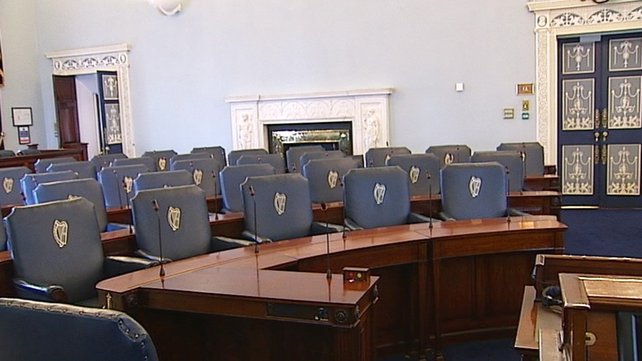Candidates continue to announce their intention to run for the University of Dublin (Trinity) constituency in the elections for the 25th Seanad Éireann, with Trinity graduate Ed Davitt having announced his candidacy most recently on February 11.
The other candidates announced so far are president of Trinity College Dublin’s Students’ Union (TCDSU) Lynn Ruane; computer science graduate Eoin Meehan; long-standing senator David Norris; neuroscience graduate Sabina Brennan; medicine graduate Anthony Staines; and journalist and former member of the Armed Forces Tom Clonan.
Ed Davitt is one of two candidates running for the Seanad on the platform of seeking votes for citizens who have emigrated from Ireland. He is a signatory of the Emigrant Manifesto, which claims emigrants are being disenfranchised by being denied the right to vote in Irish elections. A Trinity History graduate with an MA from UCD, he currently lives in Brussels. He has previously been employed by Greenpeace and the Green Party in Ireland and Europe. Another emigrant, Barry Johnston, is running for the Seanad on the NUI panel.
The current president of TCDSU, Lynn Ruane is likely the most well-known Seanad candidate to current TCD students. Elected to the position last February with over 42% of the first-preference vote, Ruane ran on a platform of reducing inequality and increasing access to higher education. After leaving school at the age of 15, she spent a number of years working in addiction services and counselling, before coming to Trinity to study PPES through the Trinity Access Programme. She has been extremely active over the course of her year in office, opposing the introduction of higher fees and loan schemes, and making a number of appearances in the national media. She lives on campus with her two daughters.
Born to emigrants in London, Eoin Meehan learned programming in the very early days of modern computing, eventually working for a number of organisations including Intel and Bank of Ireland. In 2006, he enrolled in Trinity as a mature student to take an M.Sc in Computer Science. He has since worked on projects with the School of Computer Science, Dell, and the European Union, and co-founded a start-up of his own. Owing to his experience in the sector, tech issues are to the forefront of his campaign. Some of the areas he is focussing on include digital privacy, data protection, cyberbullying, and access to broadband.
David Norris is the longest-standing senator on the Dublin University panel. A Foundation Scholar during his time at Trinity, he was a lecturer in English Literature until 1996. A long-time civil rights campaigner, he was first elected to the Seanad in 1987. In 1988, after previous rulings against him in the Irish courts, the European Court of Human Rights struck down Ireland’s criminalisation of homosexuality in the Norris v. Ireland case. Norris has remained a highly visible public figure in recent years, most notably for his role in the Marriage Equality campaign, his boundless enthusiasm for the work of James Joyce, and his unsuccessful bid for the presidency in 2011.
Sabina Brennan graduated from Trinity in 2007, and received her PhD in neuroscience in 2011. Before this, she had spent 16 years working for Irish Life PLC, and spent time as an actor, including appearances in Fair City. She works at the Institute of Neuroscience in TCD, and was involved in the grant of €138m to TCD and UC San Francisco from Atlantic Philanthropies, to establish the Global Brain Health Institute. She pledges to focus on human rights, health, education and equality. Promises include commitments to work to remove gender discrimination from the constitution, increase access to higher education, and increase the legal rights of intersex people.
After studying medicine in Trinity, Anthony Staines studied Epidemiology in London, and completed a PhD in the University of Leeds. He worked in the Department of Public Health in UCD for 10 years, and is now an academic in DCU, where he is the chair of Health Systems. He intends to use his position in the Seanad to concentrate on issues of public health policy, and to work to improve “access, quality, safety and resources” in the health service. He also pledges to support more equitable access to higher education. A supporter of Fine Gael, he lives in Skerries, Co. Dublin with his family.
Tom Clonan graduated from Trinity in 1987, before joining the Defence Forces, where he served both at home and in the Middle East. He became prominent in the early 2000s for his doctoral work documenting sexual harassment and assault within the Defence Forces. His work and experiences as a whistleblower have been featured in documentaries by RTÉ and TV3. He lectures at DIT’s School of Media, and has written two books. He writes for a number of national publications, including the Irish Times. Living in Dublin with his family, his 13-year old son suffers from physical disabilities, and has to use a wheelchair. Clonan’s senate campaign focuses largely on disability issues, seeking to end discrimination in the areas of education, health and employment, while fighting for the rights of carers.
All Trinity graduates have the right to vote and elect three senators to the upper house of the national parliament. The condition was established in 1937 under the country’s new constitution, and the University of Dublin panel has sent a total of 22 people to the Seanad since that time. The college’s current trio of senators, David Norris, Ivana Bacik, and Seán Barrett, are all well-known in both national and campus life. Ivana Bacik and Seán Barrett, have not yet confirmed whether or not they will seek re-election in 2016.







